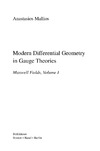Differential geometry, in the classical sense, is developed through the theory of smooth manifolds. Modern differential geometry from the author’s perspective is used in this work to describe physical theories of a geometric character without using any notion of calculus (smoothness). Instead, an axiomatic treatment of differential geometry is presented via sheaf theory (geometry) and sheaf cohomology (analysis). Using vector sheaves, in place of bundles, based on arbitrary topological spaces, this unique approach in general furthers new perspectives and calculations that generate unexpected potential applications.
Modern Differential Geometry in Gauge Theories is a two-volume research monograph that systematically applies a sheaf-theoretic approach to such physical theories as gauge theory. Volume 1 focused on Maxwell fields. Continuing in Volume II, the author extends the application of his sheaf-theoretic approach to Yang–Mills fields in general. The important topics include: cohomological classification of Yang–Mills fields, the geometry of Yang–Mills A-connections and moduli space of a vector sheaf, as well as Einstein's equation in vacuum.
The text contains a wealth of detailed and rigorous computations and will appeal to mathematicians and physicists, along with advanced undergraduate and graduate students, interested in applications of differential geometry to physical theories such as general relativity, elementary particle physics and quantum gravity.
 |
|
О проекте
|
|
О проекте


